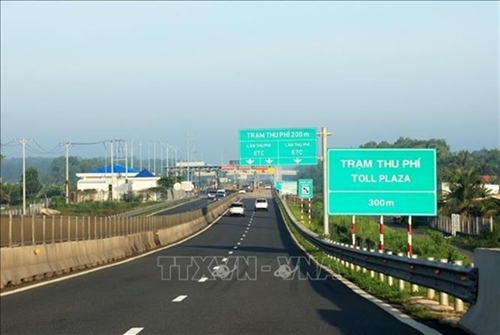According to the ministry, expressways play a crucial role in national development, reducing travel time between regions, promoting socio-economic growth, and ensuring national security and defense, both at the state and local levels where expressways pass through.
In the proposal, the ministry said that vehicles using expressways will save a certain amount compared to travelling on national highways.
    |
 |
|
Vehicles travelling on Trung Luong - My Thuan expressway |
Currently, each vehicle saves about VND 5,265 (USD 0.22) per kilometer when using the Cau Gie - Ninh Binh, Ho Chi Minh City - Trung Luong and Ho Chi Minh City - Long Thanh - Dau Giay expressways.
This cost-saving is achieved through a 25% reduction in vehicle operating expenses and a 75% reduction in travel time.
Passenger vehicles with 30 seats or more save the most, with an estimated average of VND 12,348 (USD 0.51) per kilometer while trucks under two tons save VND 1,974 (USD 0.08).
For commuters, using expressways will lead to a 60% reduction in travel time.
As per the national socio-economic development strategy for the 2021-2030 period, the goal is to have about 5,000 kilometers of expressways nationwide by 2030, out of the total planned length of 9,014 kilometers.
To achieve this goal, initial investment capital for construction, management, and operation until 2030 is estimated at around VND 813 trillion (over USD 34 million).
For the 2021-2025 period, about VND 393 trillion (USD 16.5 million) is needed to complete 2,043 kilometers and commence the construction of 925 kilometers of expressways, according to the ministry.
Collecting tolls for expressway use through booths is one of the tools and solutions aimed at enhancing management efforts. This approach helps balance the flow of vehicles on expressways and existing national highways, enabling load control, monitoring and restricting vehicles that do not meet standards, and prohibiting their travel on expressways.
These measures contribute to improving the effectiveness of expressway operations and enhancing the benefits they bring.
The collected toll fees will be contributed to the State budget and utilized according to regulations on budget allocation. This allocation prioritizes investment funds, management, and road maintenance.
It also supports road investment projects through the Build-Operate-Transfer (BOT) contract model, especially in cases affected by traffic diversion due to the opening of the expressway routes (compared to the initial terms of project contracts).
The mechanism for sharing toll revenue is based on the investment ratio of both the central and local budgets participating in expressway investment projects.
Source: VNA